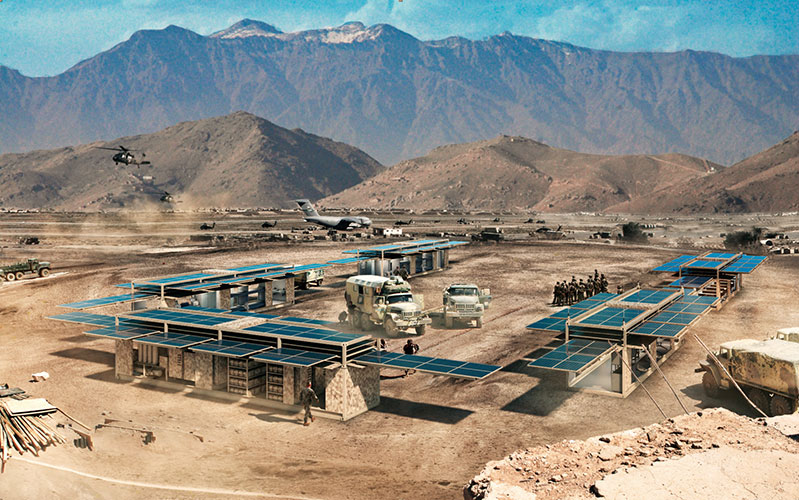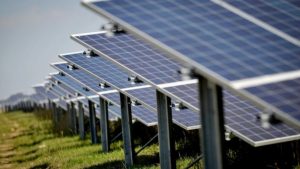
Energy is usually part of the biggest spend for military formations across the world, both at warfronts and in bases. The growing strides in renewable energy technologies and deployment however presents an economically viable window the Nigerian Military can explore to win its fights and keep its barracks energized.
Modern warfare is characterized by constant preparation, speed, tactics, flexibility and above all, maneuverability of men and equipment alike.
It wasn’t until a warhead was mounted on a missile capable of traveling halfway across the globe that a nuclear bomb though very destructive, truly became the most powerful weapon man ever made and engaged in war.
As it has turned out to be, successful armies throughout history haven’t necessarily been the smartest, swiftest or the strongest, but those most capable of adapting to situations and changing their operational modes, including their energy supply sources.
Following this ever-changing conditions at warfronts, the American Army decided to better secure its sources of power by co-opting renewable energy sources in the energy mix of their military bases both in active duty and at home. Reports indicate that with about 17 large scale renewable project at disparate levels of completion and meeting 3.5 per cent of its total energy from renewable sources in 2014, the US Army may be lagging but remains focused on generating 30 per cent of its power from renewable energy sources by 2025 – which is 8 years away from now.
Back home, in a more localized considerations of some of the contemporary challenges of the Nigerian Military in its fight against terrorists in the North East, it is envisaged that having power economically supplied to military bases and warfronts to complement their operation, would be quite demanding if not incredible for the military.
Now, imagine the level of war victories that could be accomplished because the Nigerian Army deployed mobile communication packs powered by small solar panels and batteries whilst advancing under the hot and bright North East sun, or that the Air Force was able to carry out midnight raids on terrorists’ sanctuaries with a certainty that their runway lights and airstrip guiding systems would not suddenly give out because they are powered by independent wind-power generating units dedicated to the airfield.
Also, imagine the storyline today if the Government Secondary School in Chibok had solar PVs on its zinc rooftops which generated solar electricity that powered all of its offices, dormitories, and fields, and with which the 276 school girls abducted by terrorists may have been able to evade their captors, or the military tracked such nocturnal operations, for it was told that the lack of electricity in the school contributed to the success of the abduction.
Even more innovative would be solar powered drones endlessly scouting enemy locations or the rapid deployment of mobile bases due to solar powered cars and tents.
All these are within the reach of today’s science and remain surprisingly cheap to attain at the foundational level. The begging question however is, why has the use of smart renewable energy technologies never crossed the mind of the Nigerian Military in their operations especially in these trying times and locations?
Indeed, many warfare experts have stated that the one silver lining of the military’s fight with insurgents has been its compelling demand on the Army to evolve it strategies and operations in leaps within a relatively short period, as well as its recent look-in on domestic capacities for some of hardware supplies.
On the back of this, the Army now has a window to look-in and turn to the various renewable energy options that can help reinforce its national security duties. Such drive for renewable energy in the military is no part of a greater liberal agenda to push green energy usage, but a prudent course of action that it must adapt to stay active and nimble in today’s technologically savvy battleground.
The ability of the military to live up to its missions depend largely on its unfettered access to energy in battlefields and base camps, unfortunately, the Nigerian electricity grid has not provided enough power for its citizens including the military at war fronts and barracks across the country.
On one hand, among the government’s debtors to electricity companies in the country today, the military is the biggest with debts for electricity consumed by it dating back to the years of the defunct PHCN.
Today, the realistic situation is that renewable energy is cheaper for middle level consumption in a small community, provided the source of power such as wind and the sun are in abundant supply, and given that most military barracks are isolated from cities, have lots of unused land and are usually not too densely populated, a hybrid of renewable options could easily be installed to provide electricity in barracks, whilst saving money for the military in the mid to long term.
In adopting this as a pragmatic step to energy security, the Nigerian Army would dip its toes into the endless rivers of options that renewable energy offers, knowing that it can constantly infuse and evolve its capacities with modern technologies which complement its warfare and safe keeping tasks.





